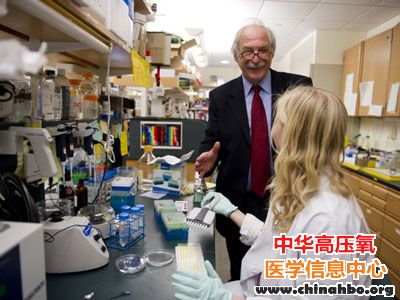氧气推动医疗进步——氧气赋予杀死癌症的免疫细胞以新的生机
 此主题相关图片如下:1.jpg
此主题相关图片如下:1.jpg
据在小鼠中所做的一项新的研究披露,吸入更多的氧气可减弱肿瘤对杀死癌症的免疫细胞的抵御力。
这些结果表明,补充氧气这种在医院内广泛使用的方法可与免疫疗法结合以更有效地治疗癌症。快速生长的肿瘤通常会消耗如此多的氧气,使得它们生活在缺氧或低氧的环境中。在缺氧情况下,癌细胞会产生腺苷,这是一种信号转导分子,它能阻断免疫反应,从而保护癌细胞不受T细胞及自然杀伤细胞的攻击。Stephen Hatfield和同事想知道,如果提供60%的氧气(这是在吸氧疗法中常用的氧气浓度)相对于21%的氧气浓度(这是我们呼吸的空气中的氧气浓度)是否会削弱肿瘤的抑制免疫作用。
在一种肺癌及另外一种转移性乳腺癌的小鼠模型中,吸入60%的氧气可帮助缩小肿瘤并提高存活率。研究人员发现,氧气将肿瘤的环境从一种对免疫细胞不友善的环境转变成为一种容许的环境,从而允许更多数量的T细胞和自然杀伤细胞穿透肿瘤。同时接受氧气和免疫疗法(它包括注射培养的抗肿瘤T细胞)治疗的患肺癌小鼠甚至会比只接受免疫疗法的小鼠表现出了更大的肿瘤缩减。
据研究人员透露,部分因为他们的这项研究,目前有一个针对肺癌病人的临床试验,其正在测试补充氧气与一种癌症疫苗的组合疗法。
Antitumor T cells either avoid or are inhibited in hypoxic and extracellular adenosine-rich tumor microenvironments (TMEs) by A2Aadenosine receptors. This may limit further advances in cancer immunotherapy. There is a need for readily available and safe treatments that weaken the hypoxia–A2-adenosinergic immunosuppression in the TME. Recently, we reported that respiratory hyperoxia decreases intratumoral hypoxia and concentrations of extracellular adenosine. We show that it also reverses the hypoxia-adenosinergic immunosuppression in the TME. This, in turn, stimulates (i) enhanced intratumoral infiltration and reduced inhibition of endogenously developed or adoptively transfered tumor-reactive CD8 T cells, (ii) increased proinflammatory cytokines and decreased immunosuppressive molecules, such as transforming growth factor–β (TGF-β), (iii) weakened immunosuppression by regulatory T cells, and (iv) improved lung tumor regression and long-term survival in mice. Respiratory hyperoxia also promoted the regression of spontaneous metastasis from orthotopically grown breast tumors. These effects are entirely T cell– and natural killer cell–dependent, thereby justifying the testing of supplemental oxygen as an immunological coadjuvant to combine with existing immunotherapies for cancer
Science Translational Medicine 04 Mar 2015: Vol. 7, Issue 277, pp. 277ra30 DOI: 10.1126/scitranslmed.aaa1260